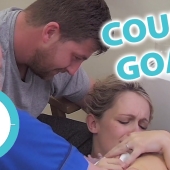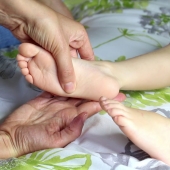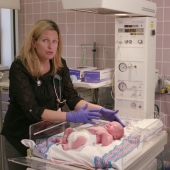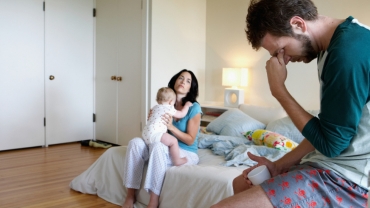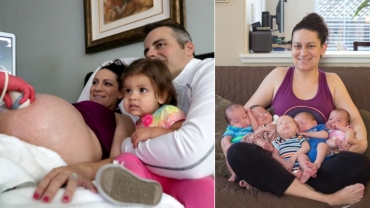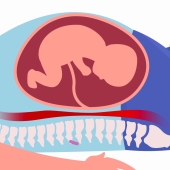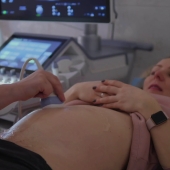When you find out that you're pregnant, you should contact your GP surgery as soon as possible to arrange a booking appointment with the midwife. When you book with your midwife, you will be offered antenatal screening tests. It is important that you understand what these tests are for and what results may be reported.
Screening is a method of identifying if you are more likely or less likely to be affected by the condition being screened for. Screening is not diagnostic so it is possible to have a high-risk result. But further tests confirm you or your baby are not affected by the condition. But it is also possible to receive a low-risk result and discover that you or your baby are affected by the condition.
You will be given a booklet by your midwife or posted to you by the hospital which will explain all the screening tests that we offer. This booklet is called screening tests for you and your baby written by the National screening committee. You can find this leaflet online by searching for the National screening committee. Screening test view in your baby booklet this booklet is available in many different languages.
It is important that you understand what screening tests will be offered, so that you are making an informed decision to accept the test and the possible results or that you are making an informed decision to decline any or all of the tests offered.If you feel you need further information then you can contact the screening team directly.
Our number is available on the website or in your handheld notes. At your booking appointment you will be offered blood tests. These blood tests will tell us your blood group and your iron level.The screening test offered at your booking appointment include testing for infectious diseases such as hepatitis B, HIV and syphilis. These conditions are not common but if you do test positivei it is vital that you are looked after by expert doctor.
Correct management would ensure that the risk of you passing any of these infections on to your baby are very low, but if we do not know that you are positive there is an increased risk that your baby will also be infected. These conditions affect your red blood cells' hemoglobin and are inherited by your own mother or father. If you suffer with a sickle cell or a fallacy Nia disease you will know as you will have had a lifetime of care.
When you are pregnant we are identifying women who may be carriers. This would mean that you are healthy but could pass on an effective gene to your baby. Your midwife will ask you your family's ethnic background going back at least three generations. This is because the conditions are more common in different parts of the world. So the laboratory needs to know this information to accurately screen your blood. If the laboratory identified the you are carrier of an unusual hemoglobin then they will ask the screening team to screen the father of your baby.
You would both have to carry similar unusual hemoglobin to have a risk of your baby inheriting a serious condition. If there are any positive results or concerns with your blood results you should be contacted within 10 days. Sometimes results are not clear or labeling laboratory errors occur and the laboratory requests a further sample.
The midwife will write the results in your handheld notes at your next appointment. Following a booking appointment with your midwife a scan appointment will be arranged. At this appointment you will be offered a screening test for three serious chromosome conditions. This is called the combined test, and will identify if you have a high risk or a low risk of having a baby with trisomy 21 Down syndrome, trisomy 18 Edwards syndrome or trisomy 13 Pascal syndrome.
When you arrive at the scan you may be asked to sign the consent form that was sent to you with your appointment. If you wish to decline screening, then please indicate this on the form and inform the sonographer when you move through to the scan room. If you are unsure whether to accept or decline the screening test then please discuss with the midwife. If your pregnancy is further than 14 + 1 weeks we will not be able to offer the combined screening test, but we will offer you a quadruple screening test. This test can only give you a risk for trisomy 21.
Following your scan you will be asked to have a blood test. The blood test is essential to complete the screening. The screening team receive the results within three days and if you have a low-risk result you will receive a letter with a copy of your result usually by seven days. If you have any questions when you receive your results please contact the screening team. If you have a high risk result then the screening team will contact you by phone and discuss what further tests are available.
The screening team will coordinate any further tests and/or appointments that are required with the specialist fetal medicine consultant. When you have had your scan an appointment will be given to you for your next scan. This is called the anomaly scan and should be performed by twenty weeks and six days. The anomaly scan is the fourth antenatal screening test that all women are offered.
This scan will look closely at your baby and if any concerns are identified you will be referred to the screening team or the fetal medicine consultant in some cases. We will refer you to a specialist London hospital usually for Georgia´s or Thomases for a further opinion. The sonographer must be certain structure to complete the scan more information can be found in the screening tests for you and your baby booklet.
Some babies can be lying in a difficult position so the sonographer cannot feel the structures clearly. If this happens then you may be rebooked to return. We would want to complete the scan by the time you are 23 weeks. It is important to understand that this is a screening test and that's not all conditions can be identified on scan.
Please remember to keep your screening test view in your baby booklet throughout your pregnancy and in the early weeks after your baby is born. The screening team can be contacted for any extra information you may require. The contact details are available in the maternity section of the trust website or in your booklet.
- 1056 views

